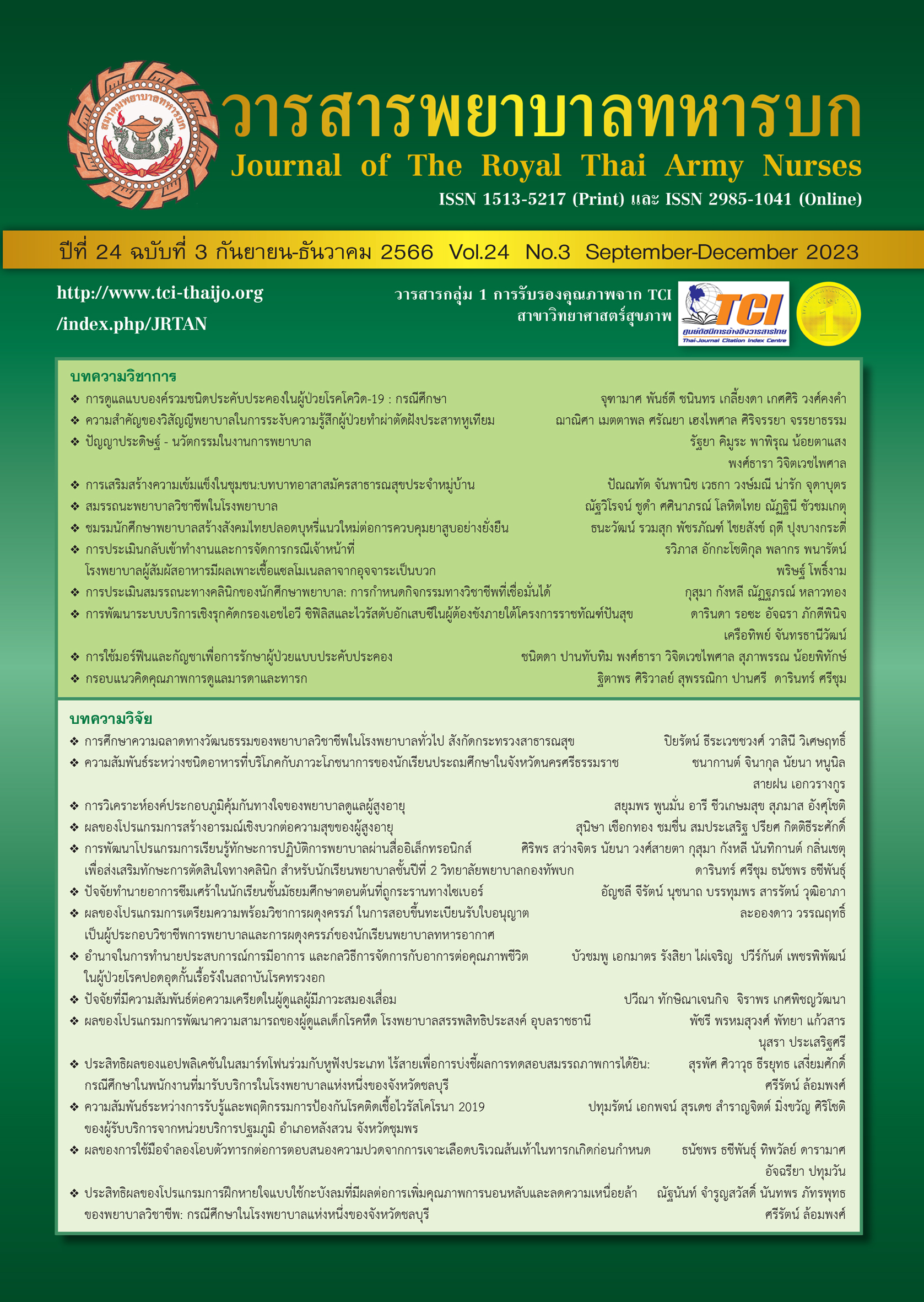Effects of the Perceived Self-efficacy Promoting Program on Knowledge and Skills in Emergency Medical Services among Emergency Medical Responders at Sam Ngam District, Phichit Province
Keywords:
Perceived Self-efficacy, Emergency Medical Services, Emergency Medical RespondersAbstract
This quasi-experimental research purposed to investigate the effects of the perceived self-efficacy promoting program on knowledge and skills in emergency medical services among emergency medical responders at Sam Ngam District, Phichit Province. Such a program was designed regarding Bandura’s self-efficacy theory. The sample was 60 emergency medical responders divided into two groups, 30 in experimental group and 30 in control group. The experimental group received the self-efficacy promoting program on emergency medical services among emergency medical responders. Questionnaires assessing knowledge and skills in emergency medical services were used to collect data. The reliability (KR20) of the questionnaires was examined, and the results were 0.82 and 0.71, respectively. Data were analyzed by using percentage, mean and standard deviation. The two-way repeated measure ANOVA was utilized to compare the mean score of knowledge and skills in emergency medical services between the experimental group and the control group, while the one-way repeated measure ANOVA was used to compare such mean scores within experimental group.
The results revealed that: 1) at the post-test stage and 2-month follow-up period, the experimental group had a higher mean score of knowledge and skills in emergency medical services than before the experiment at a significant level.05 (F= 32.839, p-value<.05 และ F = 79.530, p-value<.05, respectively); 2) at the post-test stage and 2-month follow-up period, the experimental group had higher mean score of knowledge and skills in emergency medical services than the control group at a significant level.05 (F = 40.390, p-value<.05 and F = 36.295, p-value<.05, respectively)
Downloads
References
Daendee T, Songserm N, Wonglao P, Swatpant N. Success of the operation emergency medical service system of Ubon Ratchathani Province, UBRU Journal for public health research. 2018; 7(1): 91-102. (in Thai)
Chartkul M. Factors Related to Death in Trauma Patients of Advanced EMS in Thailand, Journal Prapokklao Hospital Clinical Medical Educatation Center. 2014; 31(4): 311- 26. (in Thai)
Mills, E., Aasbjerg, K., Hansen, S. M., Ringgren, K. B., MB, Dahl, M., Rasmussen, B. S., TorpPedersen, C., Søgaard, P., & Kragholm, K. Prehospital time and mortality in patients requiring a highest priority emergency medical response: a Danish registry-based cohort study. The British Medical Journal Open. 2019; 9(11): 230-49.
Nongchang P, Poomsaidorn T, editors. Operation of emergency medical services system in local administrative organizations. 1st ed. Thailand: New Thammada press; 2011
Sirisamud T, Wachiradilok P, Singpayak C, editors. Emergency service annual report 2015. 1st ed. Thailand: Ultimat printing; 2015
Accident and Emergency Department, Emergency medical service performance report. Phichit. Sam Ngam Hospital; 2018. (in Thai)
Janpilom N. Effect of self-efficacy promoting program on ability regarding emergency medical service among first responders. (thesis). Phitsanulok. Naresuan University; 2015. (in Thai)
Iamsupasit S. Theories and techniques in behavior modification. 5th ed. Bangkok: Chulalongkorn University; 2006
Awae H, Khupantavee N, Damkliang J. Effect of a Self-Efficacy Enhancement Program on Capability of Trauma Patient Care on Scene and During Transfer by Emergency Medical Technician Personnel, Prince of Songkla University. Songklanagarind Journal of Nursing. 2020;(3): 15-23. (in Thai)
Kitreerawutiwong N. Public health research from principle to practice. 1st ed. Naresuan University. Naresuan University Publishing House: 2017
Mokarat B. The development of patient transferring to hospital in emergency medical services system of resuscitation unit in Joata subdistrict administration organization, Kamalasai district, Kalasin province Thailand. (thesis). Mahasarakham: Mahasarakham University;2014 (in Thai)
Soowit B and Others. An Evaluation of Emergency Medical Service Nursing Course of Kuakarun Faculty of Nursing, Navamindradhiraj University. Journal of The Royal Thai Army Nurses. 2015; 16(2): 41-9. (in Thai)
Sasang N, Chusak T, Samee A. Effect of The Resuscitation Training Program on Knowledge and Skills and Perceived Self-Efficacy of Resuscitation Village Health Volunteers in Khlong Chik Subdistrict, Bang Pra in District, Phra Nakhon Si Ayutthaya Province, Journal of The Royal Thai Army Nurses. 2020; 21(3): 283-93. (in Thai)
Pumvisat R. Nursing management of training pattern for the emergency medical system in Suphanburi Province. (thesis). Nakhon Pathom: Christian University. 2012 (in Thai)
Kanfong K. Effectiveness of knowledge and skill improvement program of basic response to stroke patients for emergency medical responders. Nonthaburi: Sukhothai Thammathirat Open University. 2017 (in Thai)
Downloads
Published
How to Cite
Issue
Section
License
Copyright (c) 2023 Journal of The Royal Thai Army Nurses

This work is licensed under a Creative Commons Attribution-NonCommercial-NoDerivatives 4.0 International License.
บทความหรือข้อคิดเห็นใดใดที่ปรากฏในวารสารพยาบาลทหารบกเป็นวรรณกรรมของผู้เขียน ซึ่งบรรณาธิการหรือสมาคมพยาบาลทหารบก ไม่จำเป็นต้องเห็นด้วย
บทความที่ได้รับการตีพิมพ์เป็นลิขสิทธิ์ของวารสารพยาบาลทหารบก
The ideas and opinions expressed in the Journal of The Royal Thai Army Nurses are those of the authors and not necessarily those
of the editor or Royal Thai Army Nurses Association.






